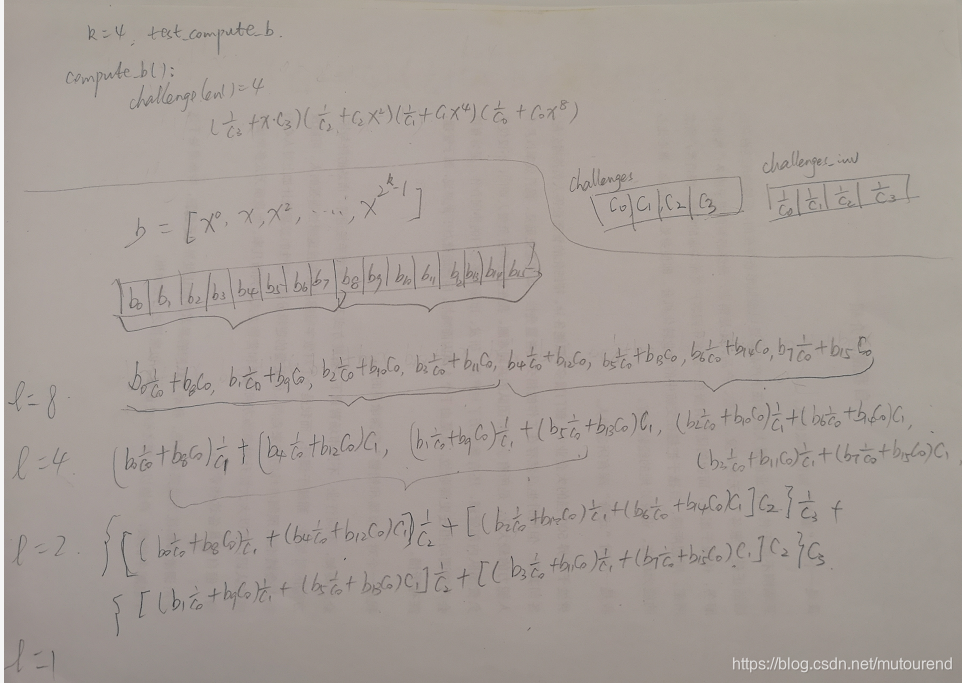1. compute_b()函数
cargo test test_compute_b -- --nocapture
test_compute_b测试函数基本流程如下:

compute_b函数实际是计算的公式(假设
challenges.len()):
pub fn compute_b<F: Field>(x: F, challenges: &[F], challenges_inv: &[F]) -> F {
assert!(!challenges.is_empty());
assert_eq!(challenges.len(), challenges_inv.len());
if challenges.len() == 1 {
return *challenges_inv.last().unwrap() + *challenges.last().unwrap() * x;
} else {
return (*challenges_inv.last().unwrap() + *challenges.last().unwrap() * x)
* compute_b(
x.square(),
&challenges[0..(challenges.len() - 1)],
&challenges_inv[0..(challenges.len() - 1)],
);
}
}
2. my_test_circuit()函数
cargo test my_test_circuit -- --nocapture
#[derive(Clone)]
pub struct Params<C: Curve> {
pub g: C, //为曲线C的one点。
pub d: usize,
pub n: usize,
pub k: usize,
pub generators: Vec<C>, //为用于circuit的随机点序列。如用于commitment时的随机generator
pub generators_xy: Vec<(C::Base, C::Base)>,
}
//随机从曲线C上选择2^k个point点。
pub fn new(k: usize) -> Self {
use crossbeam_utils::thread;
assert!(k > 3);
let d = 1 << k;
let n = d / 4;
let mut generators = vec![C::zero(); d];
let mut generators_xy = vec![(C::Base::zero(), C::Base::zero()); d];
// TODO: use public source of randomness
let num_cpus = num_cpus::get();
let mut chunk = d / num_cpus;
if chunk < num_cpus {
chunk = d;
}
thread::scope(|scope| {
for (gen, gen_xy) in generators
.chunks_mut(chunk)
.zip(generators_xy.chunks_mut(chunk))
{
scope.spawn(move |_| {
use rand_core::{OsRng, RngCore};
let mut attempt = [0u8; 32];
'outer: for (gen, gen_xy) in gen.iter_mut().zip(gen_xy.iter_mut()) {
loop {
OsRng.fill_bytes(&mut attempt);
let attempt = C::from_bytes(&attempt);
if bool::from(attempt.is_some()) {
let attempt = attempt.unwrap();
let (x, y, z) = attempt.get_xyz();
assert!(z == C::Base::one());
*gen = attempt;
*gen_xy = (x, y);
continue 'outer;
}
}
}
});
}
})
.unwrap();
Params {
g: C::one(),
k,
d,
n,
generators,
generators_xy,
}
}
// 4 * 128 + 6 * 256 + k * 128 + 256 + k * 128 + 5 * 256
// = 12 * 256 + (4 + 2k) * 128
#[derive(Clone)]
pub struct Deferred<F: Field> {
// comes from circuit
pub x: F,
// enforced to equal old leftovers
pub y_old: F,
// comes from circuit
pub y_cur: F,
// comes from circuit
pub y_new: F,
// enforced
pub ky_opening: F,
pub tx_positive_opening: F,
pub tx_negative_opening: F,
pub sx_cur_opening: F,
pub rx_opening: F,
pub rxy_opening: F,
// enforces to equal old leftovers
pub challenges_sq_packed_old: Vec<F>,
// fed to circuit
pub gx_old_opening: F,
// comes from circuit
pub challenges_sq_packed_new: Vec<F>,
// fed to circuit
pub b_x: F,
pub b_xy: F,
pub b_y_old: F,
pub b_y_cur: F,
pub b_y_new: F,
}
/// Packed challenge that happens to end up being valid on both curves
const MAGIC: u64 = 12;
pub fn dummy(k: usize) -> Self {
let challenges_sq_packed = vec![F::from_u64(MAGIC); k];
let challenges_sq_new: Vec<F> = challenges_sq_packed
.iter()
.map(|v| get_challenge_scalar(*v))
.collect();
let challenges: Vec<F> = challenges_sq_new
.iter()
.map(|v| v.sqrt().unwrap())
.collect();
let mut challenges_inv = challenges.clone();
F::batch_invert(&mut challenges_inv);
let b_one = compute_b(F::one(), &challenges, &challenges_inv);
Deferred {
x: F::one(),
y_old: F::one(),
y_cur: F::one(),
y_new: F::one(),
ky_opening: F::zero(),
tx_positive_opening: F::zero(),
tx_negative_opening: F::zero(),
sx_cur_opening: F::zero(),
rx_opening: F::zero(),
rxy_opening: F::zero(),
challenges_sq_packed_old: challenges_sq_packed.clone(),
gx_old_opening: b_one,
challenges_sq_packed_new: challenges_sq_packed.clone(),
b_x: b_one,
b_xy: b_one,
b_y_old: b_one,
b_y_cur: b_one,
b_y_new: b_one,
}
}
pub fn verify(&self, k: usize) -> bool {
let (lhs, rhs) = self.compute(k);
let correct_gx_old_opening = {
let challenges_sq_old: Vec<F> = self
.challenges_sq_packed_old
.iter()
.map(|v| get_challenge_scalar(*v))
.collect();
let mut challenges = challenges_sq_old.clone();
for a in &mut challenges {
*a = a.sqrt().unwrap(); // TODO
}
let mut challenges_inv = challenges.clone();
F::batch_invert(&mut challenges_inv);
compute_b(self.x, &challenges, &challenges_inv)
};
// TODO: prover could have put a zero here
let challenges_sq_new: Vec<F> = self
.challenges_sq_packed_new
.iter()
.map(|v| get_challenge_scalar(*v))
.collect();
let mut challenges = challenges_sq_new.clone();
for a in &mut challenges {
*a = a.sqrt().unwrap(); // TODO
}
let mut challenges_inv = challenges.clone();
F::batch_invert(&mut challenges_inv);
let b_x = compute_b(self.x, &challenges, &challenges_inv);
let b_xy = compute_b(self.x * self.y_cur, &challenges, &challenges_inv);
let b_y_old = compute_b(self.y_old, &challenges, &challenges_inv);
let b_y_cur = compute_b(self.y_cur, &challenges, &challenges_inv);
let b_y_new = compute_b(self.y_new, &challenges, &challenges_inv);
lhs == rhs
&& correct_gx_old_opening == self.gx_old_opening
&& self.b_x == b_x
&& self.b_xy == b_xy
&& self.b_y_old == b_y_old
&& self.b_y_cur == b_y_cur
&& self.b_y_new == b_y_new
}
get_challenge_scalar是将EC0和EC1两条曲线的点进行映射,根据博客Halo——zcash新的零知识证明机制,无需Trusted Setup2.1节可知,EC0和EC1的endomorphism特性:
P*p_beta==E0(x*q_beta,y)
Q*q_beta==E1(x_1*p_beta,y_1)
pub fn get_challenge_scalar<F1: Field, F2: Field>(challenge: F1) -> F2 {
let challenge = challenge.get_lower_128();
let mut acc = F2::one();
acc = acc + acc;
acc = acc + F2::one();
for i in 1..64 {
let should_negate = (challenge >> (i * 2)) & 1 == 1;
let should_endo = (challenge >> (i * 2 + 1)) & 1 == 1;
acc = acc + &acc;
if should_negate {
acc = acc - &F2::one();
} else {
acc = acc + &F2::one();
}
if should_endo {
acc = acc * &F2::BETA;
}
}
acc
}
参考资料:
[1] https://github.com/ebfull/halo/
